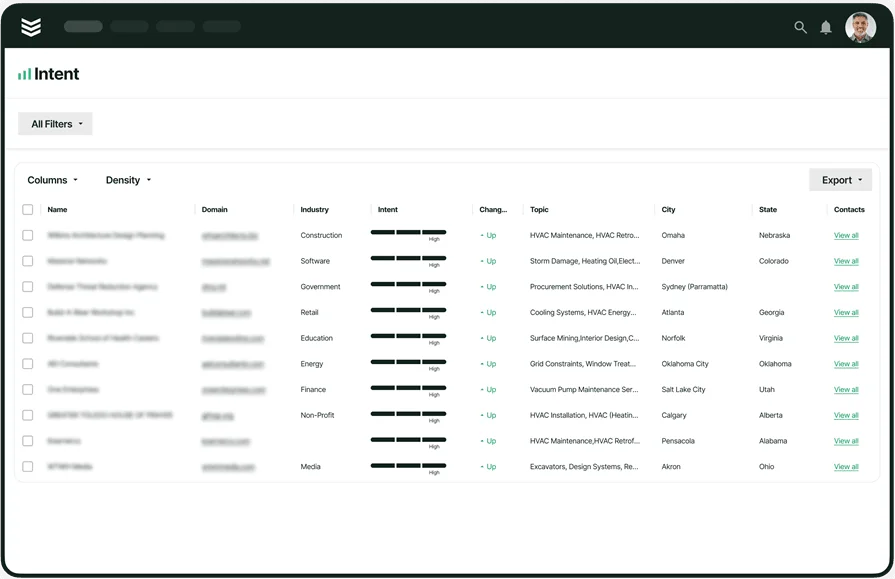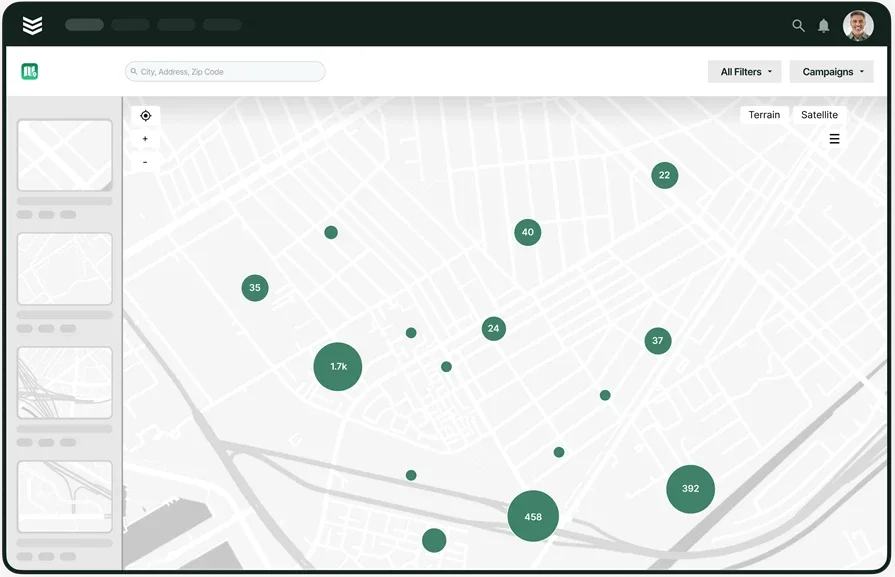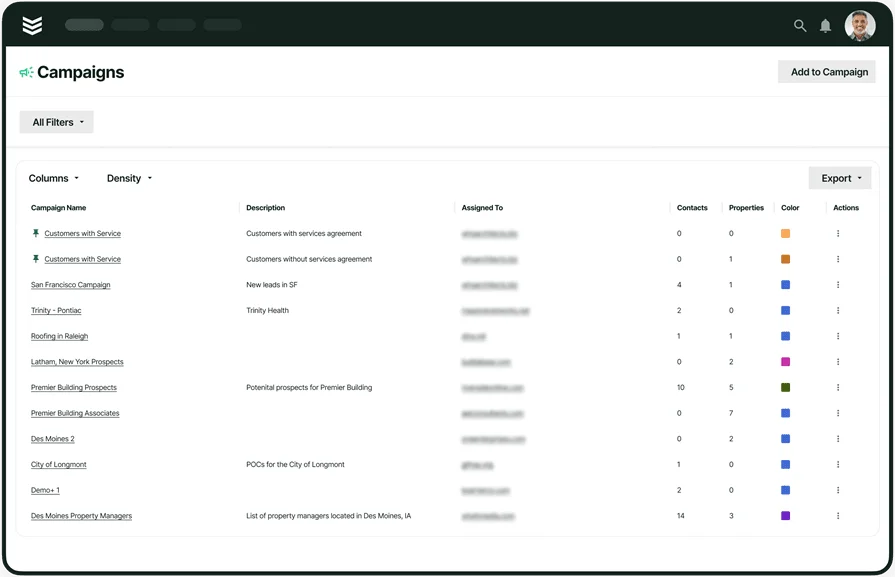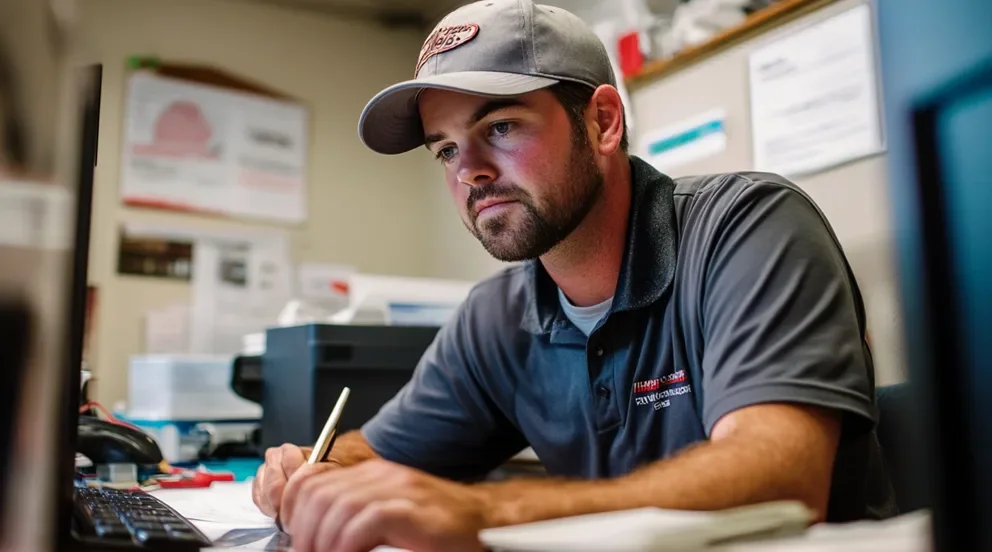Running a small construction business means wearing every hat—from foreman to bookkeeper to customer service. When project updates get lost in texts, bids slip through the cracks, or crews show up at the wrong job, you start feeling the strain. That’s where having a CRM designed for small construction operations comes in. It keeps jobs moving, communication clear, and nothing falls through the cracks.
Many small contractors are turning to platforms shaped by the needs of the construction industry—tools that bring scheduling, lead tracking, and customer management into one streamlined system. For smaller teams, it’s not about loading up on more apps—it’s about making daily work easier to handle. In this guide, we’ll break down:
- How to choose the right CRM for a small construction business
- 6 key features every small construction CRM should have
- 5 top CRM tools for small construction companies
- 7 benefits of using a CRM in a small construction business
- 4 important CRM software FAQs for small construction businesses
When you’re running a smaller crew, every decision matters—especially the software you choose to keep things organized. A generic CRM might handle contacts and reminders, but it won’t know how your business actually runs. You need something that fits the way your jobs flow, from first bid to final invoice. Let’s dig into what makes a CRM worth your time—and how to spot one that works for your kind of operation.
How to choose the right CRM for a small construction business
Small construction businesses run lean. You’ve got a tight crew, no room for wasted time, and a list of jobs that won’t wait. Whether you're in the field managing crews or in the office handling bids and billing, your CRM can’t slow you down. For small contractors, it’s got to work both ways—wherever you are.
That’s why picking the best CRM for small construction business setups comes down to more than checking off a features list. You’re choosing the system that keeps everything moving—from estimates to follow-ups. It needs to fit your jobs, your people, and how you actually work. Here’s how to choose a CRM that makes sense for your operation:
- Scalability – Can it grow with your business without overcomplicating how your team works today? Does it support more users and jobs without slowing things down? Will it keep working if you add new tools like scheduling or invoicing later?
- Integration – Does it connect with tools you're already using, like QuickBooks or your estimating software? Will it help your team avoid double-entry headaches? Can you manage leads, jobs, and billing all in one workflow?
- Ease of use – Can both field and office teams figure it out quickly? Is the layout clear enough that your crew can actually use it? Does it reduce clicks and wasted time—or add more?
- Mobile accessibility – Can your crew check job info and update progress from their phones? Will it work with spotty service areas? Can they log photos, notes, and status updates without calling the office?
- Features – Does it support bid tracking, client history, scheduling, and dispatching? Can it keep everything—from contracts to punch lists—in one place? Will it help avoid costly mistakes by making details accessible in real time?
Picking the right system is the first step. But what really sets the best CRM for small construction business operations apart are the tools built into it—the features that help you handle jobs, not just track them. From keeping your bids organized to making sure your crew hits the right site on time, the next section breaks down the must-have features that make a small construction CRM worth using.
6 key features every small construction CRM should have
In a small construction business, there’s no safety net. If one detail slips, you feel it. A wrong address, missed bid follow-up, or lost client message can sideline the whole crew. That’s why the best CRM for small construction business operations doesn’t just store contacts—it keeps your jobs, crew, and customers in sync.
Say you’re running a plumbing business with a three-man crew and you're juggling seven active jobs. One tech needs to see the latest change order. Another needs directions and scope notes for a job added late last night. Without a CRM that ties field updates to office workflows, the day starts off in the weeds. The features below are what keep small construction teams moving without the mess.
1. Mobile access for field teams
When your crew’s already rolling by 6 a.m., they need job details in their pocket—not waiting for a call back. A CRM with solid mobile access means techs can see schedules, pull up job notes, log progress, and upload photos—right from the field. No paper packets, no office runs.
Let’s say your HVAC tech is heading to a client who called yesterday with a broken unit. Instead of guessing or calling dispatch three times, the tech checks their app, sees the service history, and confirms the issue before arriving. That kind of control starts with a technician mobile app—designed to work how your crew works.
2. Job and project tracking
You’ve got bids out, subs in play, and materials on order. A small construction CRM should give you a full view of where every job stands—budget, timeline, and crew. Real-time job tracking helps you spot issues early, not when it’s already too late.
Consider this: You're a general contractor running three remodels in parallel. You check your dashboard and see framing is behind on one, ahead on another. That gives you options—shift the crew or reschedule subs. This kind of insight comes from time-tracking tools that show where every hour is going.
3. Bid and proposal management
For small contractors, missed follow-ups cost jobs. You need a CRM that keeps all your bids and proposals organized—every follow-up, status update, and approval. It helps you track which estimates are pending, which are cold, and what needs action. Let’s say you’re a roofing contractor who quoted a five-unit building. A week goes by, and you’ve moved on to other leads. With bid tracking in place, you get a ping—it’s time to follow up. That reminder could land you a $25k job. This is exactly where construction quoting software helps you stay on top of every proposal and close stronger.
4. Scheduling and dispatching
When you’ve got two crews and six jobs, efficient dispatching is everything. A CRM for small construction business setups needs to help you get the right crew to the right job—on time, with the right info. Take this: A field tech gets sent to the wrong site because the schedule changed at 7 a.m., but wasn’t communicated. With live field service scheduling and connected construction dispatch software, everyone’s looking at the same schedule—no crossed wires between office and field.
5. Invoicing and payment tools
Cash flow is everything for small teams. A CRM should handle invoicing and payments without sending your office into a spreadsheet spiral. Look for tools that create, send, and track invoices, and accept payments right through the platform. Say you're a small electrical contractor. The job’s wrapped, but the invoice? It’s sitting in a notepad on the passenger seat.
With tools like invoicing and payments, your tech finishes the job and hits “Send Invoice” before leaving the site. The client pays online—no chasing, no delay.
6. Service agreements and client tracking
Recurring work is gold for small construction teams, especially those handling HVAC, plumbing, or electrical maintenance. A small construction CRM should let you track contract renewals, schedule routine visits, and keep customer history in one place.
Say your team services a string of retail locations on quarterly maintenance contracts. With one dashboard, you can see who’s due, what was done last time, and who’s up next. That level of organization starts with tools built around service agreements and long-term client management.

Explore our CRM product
Keep client lists organized, track jobs with precision, and finish jobs faster.
Other valuable features for small construction businesses
Beyond the essential CRM functions, there are other tools that help small construction crews run tighter jobs. These are not merely additional features; they are beneficial for minimizing errors, optimizing operational efficiency, and simplifying management, particularly for individuals with diverse responsibilities. Whether it's tracking your fleet, managing repeat work, or understanding how jobs are performing, these features go a long way in simplifying the day-to-day.
- Fleet management – Managing your trucks and vans isn’t just about knowing where they are—it’s about keeping your entire team moving. Fleet tools help you track vehicle location, monitor maintenance schedules, and prevent breakdowns that cost time and money. This gives you visibility into who’s where, and when a rig might be due for service—so you’re not caught off guard mid-week.
- Reporting – Small construction teams can’t afford to guess where they’re losing time or profit. Construction reporting and analytics tools give you a clear view of what’s working, what’s costing too much, and where to make better decisions. It breaks down job costs, labor hours, and client trends—helping you see what to double down on and what to fix before it cuts into your margins.
- Pipeline – Keeping track of leads and jobs in progress can get messy fast. Pipeline tools give you a centralized view of every opportunity, from first call to contract signed. It helps small construction business owners see what’s in the pipeline, who’s following up, and where deals are falling off—making sales a process, not just a hope.
All these features work together to keep your operation tight. From the field to the office, the best CRM for small construction business teams connects every moving part—so nothing gets missed, and every job runs smoother. Now let’s break down the tools that actually deliver on that promise.
5 top CRM tools for small construction companies
Choosing the right CRM can be a turning point for small construction contractors. You need something simple enough to use daily, but powerful enough to manage real jobsite demands. Below are five CRM tools built for the trades—but each one serves a slightly different type of contractor. Here’s what they do best—and where they might fall short.
1. BuildOps: Best for small commercial construction businesses
BuildOps is built for small commercial contractors who want one place to manage bids, scheduling, job tracking, and repeat service work. It goes beyond generic CRM tools with built-in dispatch, time tracking, invoicing, and field access—all aligned with how actual small teams work day to day. It’s a unified system designed to cut the clutter and give contractors the control they need from the field to the office.
How Pricing Works: BuildOps provides custom pricing based on business size and needs. Contractors can schedule a live demo to see how it fits.
Top 3 Features:
- Field-ready job tracking – Stay updated in real-time across multiple jobsites
- Built-in scheduling & dispatch – Assign techs fast and avoid overlap
- Payment & invoicing tools – Handle billing and collections in one place
Why it’s great for small construction businesses: BuildOps helps contractors with lean teams keep jobs organized, eliminate miscommunication, and get paid faster—all without bouncing between tools.

Looking for a CRM tool?
BuildOps is designed for small crews looking to run a smarter, faster operation.
2. Buildertrend: Best for small residential contractors
Image Source: Buildertrend
Buildertrend offers a good CRM option for residential builders and remodelers, helping manage leads, proposals, client selections, and project updates in one platform. Its interface is built for custom home projects, where communication with homeowners is constant and visual updates matter. It's a popular tool among remodeling firms and homebuilders with clients who want transparency during every phase of the build. However, contractors doing commercial, service-based, or repeat work may find Buildertrend doesn’t go deep on dispatching or long-term customer tracking.
How Pricing Works: Buildertrend uses a custom pricing model based on business size, features, and user needs. You'll need to request a quote.
Top 3 Features:
- Pre-sale client tracking – Manage leads and quotes before the first contract
- Homeowner communication tools – Share updates and photos directly with clients
- Visual schedule boards – Keep everyone on the same page during each phase
Why it’s great for small construction businesses: For residential contractors, Buildertrend makes it easier to manage client expectations, track updates, and present a polished, professional image to homeowners.
3. Pipeline CRM: Best for small general contractors
Image Source: Pipeline CRM
Pipeline CRM focuses on lead management and deal tracking, making it ideal for general contractors juggling multiple project bids and contacts. Its strength lies in the sales side—capturing leads, assigning follow-ups, and closing new business efficiently. For contractors focused mostly on estimating and client conversion, it brings structure to what’s often a chaotic pre-construction process. That said, it may not support job tracking, field coordination, or invoicing workflows, which limits its usefulness once the project is underway.
How Pricing Works: Plans start at $25/month per user, making it one of the most affordable CRMs tailored for sales-driven construction teams.
Top 3 Features:
- Lead pipeline views – Visualize where every opportunity stands
- Custom stages – Align your CRM flow with how your jobs come together
- Follow-up automation – Never miss a touchpoint with potential clients
Why it’s great for small construction businesses: Pipeline CRM simplifies the sales side of contracting, helping smaller teams win more work without getting buried in spreadsheets or sticky notes.
4. ProjectManager: Best for task-driven teams needing visual project tracking
Image Source: ProjectManager
ProjectManager is designed for teams that need clear task management and visual workflows. It offers Gantt charts, real-time dashboards, and resource planning that help contractors stay on top of multiple moving parts. It’s particularly useful for small construction businesses that focus on internal coordination and time-based task tracking. However, it lacks built-in tools for CRM-specific needs like lead tracking, invoicing, or field communication, which may require pairing it with other software.
How Pricing Works: Plans start at $13/user/month for basic tools, with upgraded tiers offering advanced project controls and reports.
Top 3 Features:
- Task timelines and Gantt views – Easily map job progress and dependencies
- Resource tracking – Assign and manage your team’s workload in real time
- Live dashboards – Monitor deadlines, budgets, and project health from one screen
Why it’s great for small construction businesses: For teams that need a simple but powerful way to visualize task flow and monitor schedules, ProjectManager delivers strong coordination tools without the bulk of enterprise software.
5. Smartsheet: Best for spreadsheet-style CRM and project planning
Image Source: Smartsheet
Smartsheet brings the flexibility of a spreadsheet to the world of project and client tracking. It’s a great fit for small contractors who already live in Excel but want automation, better collaboration, and centralized control. You can manage leads, tasks, job schedules, and documentation across customizable sheets. That said, its CRM functionality is limited to what you can build and adapt—meaning there’s a learning curve, and no out-of-the-box construction templates for smaller field-service contractors.
How Pricing Works: Starts at $25/user/month for the Pro plan, with business plans offering additional integrations and automation.
Top 3 Features:
- Spreadsheet-style interface – Familiar layout with added power
- Workflow automation – Set up triggers, approvals, and reminders
- Centralized records – Store client info, documents, and schedules all in one place
Why it’s great for small construction businesses: Smartsheet gives detail-oriented contractors the flexibility to build their own processes and scale as needed—without leaving the comfort of a spreadsheet-style system.

Find the right fit for your crew
Compare leading small construction software options with this easy-to-use scoresheet.
7 benefits of using a CRM in a small construction business
For small construction businesses, a CRM isn’t just about managing contacts—it’s about gaining control over the chaos. With fewer hands on deck and tighter timelines, having a system that keeps every detail visible and every job on track can make all the difference. These benefits go beyond features—they speak directly to the wins that matter most when your crew size is small but your workload isn’t.
1. Keeps teams aligned in the field and office
Clear communication is tough when your crew’s in the field and your coordinator is buried in emails. A CRM keeps everyone synced—job updates, customer requests, schedules—all in one place. That kind of alignment minimizes confusion and saves time across the board. This is where construction field service management comes in. It explains why syncing field crews and office staff is uniquely challenging for construction businesses—and how CRM tools are built to handle it.
2. Cuts down job delays caused by miscommunication
Small construction jobs often shift daily—weather, subs, or a quick change from the client. A CRM captures updates in real time, so nothing gets missed between calls, texts, or emails. Everyone sees what’s changed, and who’s on it. Tools that support construction field service management software help document updates and reduce delays by keeping change orders and crew adjustments transparent.
3. Helps manage repeat business and service clients
Unlike big contractors chasing large one-off projects, many small shops rely on service calls and repeat clients to stay profitable. A CRM keeps track of past jobs, contracts, and client preferences—making it easier to schedule the next service before they even ask. That ongoing visibility is exactly why CRM systems are the backbone of efficient construction field report software, helping track service visits and on-site details to support long-term relationships.
4. Boosts accountability across the team
When job notes, deadlines, and client feedback live in one place, it’s easier to see who’s doing what—and where something’s slipping. CRMs make it clear who owns the next step, which keeps everyone sharper and more proactive on the job. No more guessing who was supposed to follow up or which tech didn’t close out a task. It’s all there, and easy to track.
5. Builds a clear picture of business performance
If you’re not tracking data, you’re guessing. A CRM collects job costs, response times, and client histories—all the details that tell you what’s working and what’s not. Small construction companies can’t afford waste, and a CRM helps cut it before it compounds. It’s the kind of insight that construction AI is starting to amplify—using the data already inside your CRM to predict trends and guide smarter decisions.
6. Makes customer follow-up effortless
When you're juggling multiple projects, it’s easy to forget to follow up. A CRM can automate that step—triggering reminders or emails based on job status or dates. Clients feel taken care of, and you stay top-of-mind without lifting a finger. This matters when referrals and repeat work are your lifeline.
7. Frees up time for the work that matters
At the end of the day, contractors want to build—not bounce between apps, calls, and paperwork. A CRM simplifies job management so you can spend more time on-site and less time sorting out details. It gives you back hours each week—and in a small business, that’s how you scale without adding more people.
4 important CRM software FAQs for small construction businesses
Small construction contractors don’t have time to mess with tools that don’t work. When you’re managing jobs, clients, and crews with a small team, every system you invest in needs to pull its weight. Here are the most common questions small contractors ask about CRM—and the real answers that can help you decide what fits your business.
1. What is a CRM for a small construction business?
A CRM for small construction businesses and teams helps organize jobs, clients, and field communication in one platform. It keeps proper track of bids, schedules, invoices, and customer interactions. Whether you’re sending a quote or checking on job progress, everything you need is in one place.
2. How does CRM actually work for small construction contractors?
A CRM helps small crews stay connected and organized by putting key parts of the business in one platform. That includes:
- Lead & bid tracking – Store leads, create proposals, and follow up automatically.
- Job tracking – Monitor project timelines, crew assignments, and client updates.
- Scheduling – Get the right techs to the right job and avoid mix-ups.
- Customer history – Access job notes, site photos, and communications instantly.
- Invoicing & payments – Send invoices fast and collect payments without hassle.
3. Why do small contractors actually need a CRM?
Small construction businesses don’t have room for wasted effort. A CRM keeps jobs moving, cuts down mistakes, and saves time by pulling everything into one system. Without it, you're relying on memory, texts, and sticky notes. That’s how bids get forgotten and crews show up at the wrong site. With a CRM, you get a clear view of what’s happening and where things stand.
4. What are the best practices for small contractors using CRM?
Even the best crm for small construction business setups need the right approach to get full value. Here's how small contractors can make the most of it:
- Use one platform for both field and office updates
- Keep customer info and job details updated in real time
- Schedule weekly reviews of open jobs and pending bids
- Automate follow-ups on estimates and invoices
- Assign clear owners for each client and task
- Make job photos and notes part of your daily process
- Use CRM dashboards to check in on team workload
- Track every service visit—even if it’s small
- Set up alerts for delays, missed deadlines, or overdue invoices
- Train your crew on how to use it—then actually use it
For small construction businesses, time isn’t just money—it’s momentum. When every job counts and every delay costs, having a CRM isn’t a luxury. It’s a practical way to keep everything moving, whether you’re tracking leads, managing service calls, or getting crews to the right site. The best CRM for small construction business setups doesn’t overcomplicate things—it simplifies them. It gives you visibility, control, and fewer headaches, so you can focus on running the business, not chasing down details.
And when that CRM ties into your entire workflow—field operations, scheduling, invoicing, service agreements—it stops being just a software tool and becomes part of how you get things done. That’s what platforms like BuildOps are built for: making life easier for commercial contractors running lean teams who still want to operate like pros.

Want to see it in action?
We help teams manage clients, streamline operations, and get jobs done.








